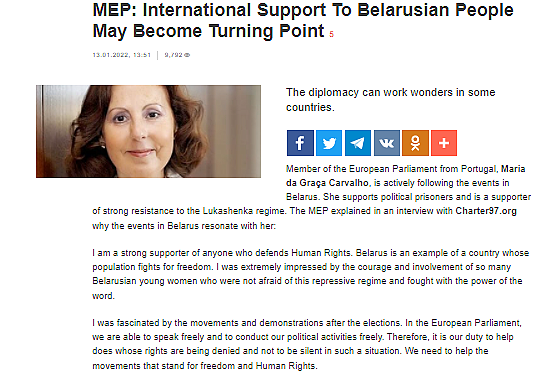Imprensa MEP: International Support To Belarusian People May Become Turning Point
Member of the European Parliament from Portugal, Maria da Graça Carvalho, is actively following the events in Belarus. She supports political prisoners and is a supporter of strong resistance to the Lukashenka regime. The MEP explained in an interview with Charter97.org why the events in Belarus resonate with her:
I am a strong supporter of anyone who defends Human Rights. Belarus is an example of a country whose population fights for freedom. I was extremely impressed by the courage and involvement of so many Belarusian young women who were not afraid of this repressive regime and fought with the power of the word.
I was fascinated by the movements and demonstrations after the elections. In the European Parliament, we are able to speak freely and to conduct our political activities freely. Therefore, it is our duty to help does whose rights are being denied and not to be silent in such a situation. We need to help the movements that stand for freedom and Human Rights.
- Your country - Portugal - in the last century also experienced rather dark times of the dictatorship of Salazar. Do you see parallels between the Salazar and Lukashenka regimes?
- I believe that Lukashenka and Salazar's regimes are in a certain way different. Salazar's dictatorship was peculiar, very rural, based on Catholic Church and colonial power. While Lukashenka’s regime is different, it is more like the former Soviet Union regime. Under Salazar’s regime, there was a lot of oppression of people, brutality, political prisoners, but it was not as visible. It was more physiological oppression. We were extremely poor and isolated. Moreover, we did not have access to independent media. Of course, there is something in common because they are both dictators, but the styles are completely different.
- How did your people manage to defeat the dictatorship?
- The turning point was the military movement mainly due to the colonial war. Many young men at age of 18 were sent to war and died there unless they managed to run away which was difficult. The military was tired of having such a war, nobody in the world supported that war and it made no sense to maintain it.
At the beginning of the Carnation Revolution, there were still fractions of the military that were on the side of the regime, but quite quickly, they united with the rest. Due to that reason, we had a peaceful revolution. On 25 April 1974, there was a popular revolution and millions of people went on the streets. However, all of it started because of the military. Our army decided to overthrow the regime due to unnecessary war in Africa.
- Carnation Revolution is an example of how the military regime was defeated without firing a shot.
- Colonialism did not make sense. It never made sense, but especially in the 1970s. Portugal was the last regime with such an empire. The military action was an important turning point. Before, we had some attempts led by civilians that were not successful. I am not sure if you can draw parallels with Belarus because I only know what is going on there from the outside. I believe that in your case the strength is the sympathy that your opposition gained from all over the world. The Belarusian opposition and its freedom fighters have done a fantastic work of spreading the news. Many European countries and the European Parliament hosted the leader of the Belarusian opposition. This is going to be probably the turning point in your case.
Important to notice that Carnation Revolution was non-violent, do you think there is a power of non-violent resistance?
I believe there is a power of diplomacy. More and more countries will support the opposition in Belarus. This is the way to go. I think it is important to continue getting support from abroad in order to make changes inside a country.
We have seen miracles in some countries. For example, a miracle that we thought could not be ever possible was the independence of East Timor. It is a small country compared to Indonesia and yet, with foreign support, it gained its independence. Of course, there was fighting involved, but it was the external support and diplomacy that made it possible.
- Speaking about European Union. What mechanisms of pressure on the Belarusian regime from the EU do you consider especially promising?
- Sanctions are important, but political pressure such as resolutions of the European Parliament, getting more support from other parts of the world, giving visibility, not forgetting the cause, and supporting it is crucial too. The sanctions should not be directed at one person, but strong and wider as we are asking in the European Parliament resolutions.
- Do you see chances to bring Lukashenka to justice? And the creation of an international tribunal over the dictator?
- It is difficult, but it is in our resolutions. It is on our table and it is important.
- We are talking at the beginning of the new 2022. What would you wish the Belarusians who are fighting for freedom in the New Year?
- In this New Year, I would like to see changes in the Belarus. I wish to see more and more strong women politicians and that freedom of speech and Human Rights become a reality in your country. You have a fantastic country. Minsk is a beautiful city. I wish you will become closer to the European Union and that Belarusians can enjoy freedom.
